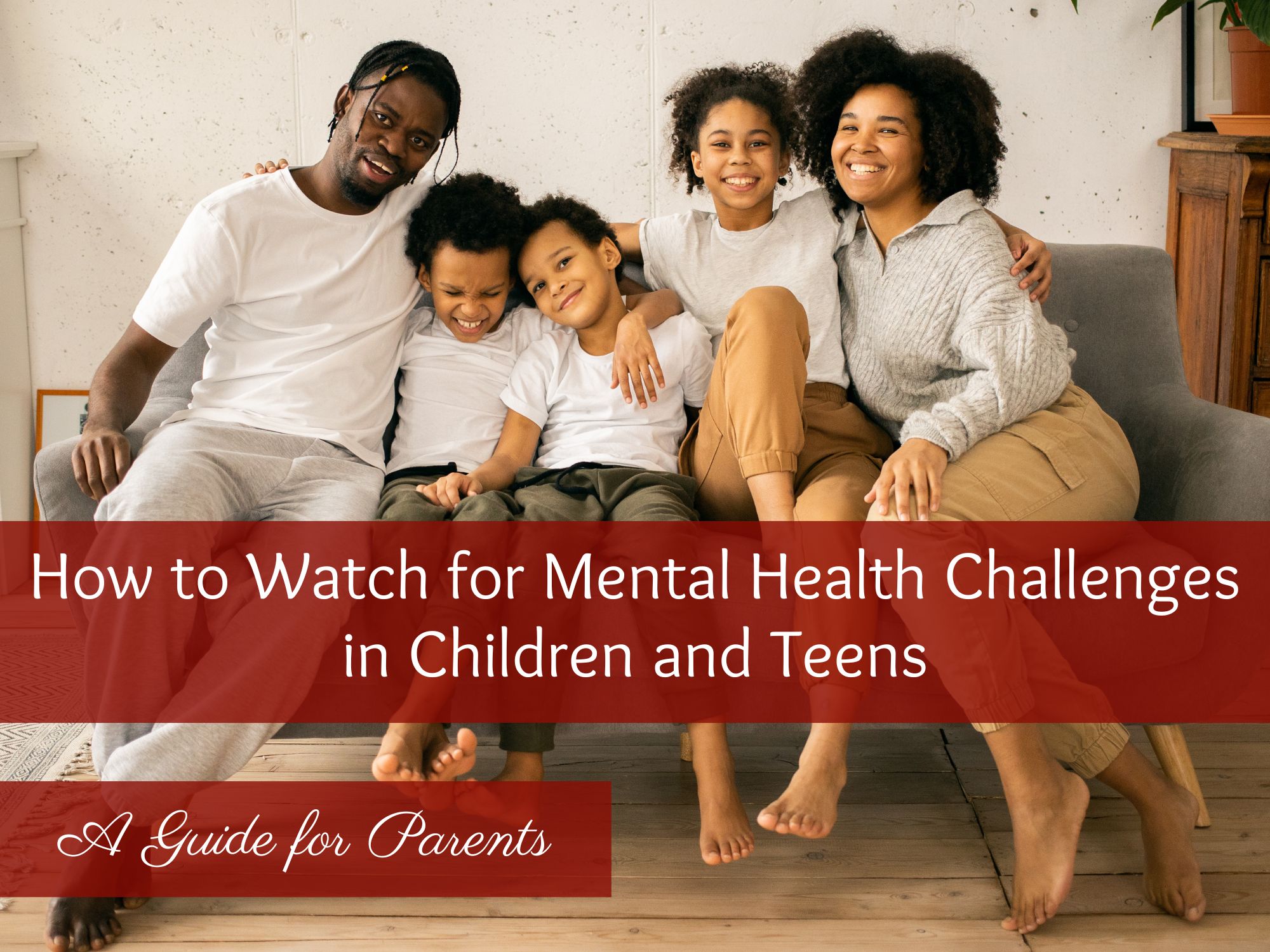It’s natural for parents to worry whether they’re doing enough to ensure their child’s well-being, especially when it comes to their mental health.
The thought of your child struggling emotionally or mentally can be overwhelming, leaving you questioning whether you’re equipped to recognize the signs or take the right steps. You might wonder, “Am I missing something? Is there a way to catch these issues early, before they become bigger problems?”
The good news is there are indeed early warning signs that can help you monitor your child’s mental health and take action when needed. By knowing what to look for and how to respond appropriately, you can make a significant positive impact on your child’s health.
In this blog, we’ll explore these signs and offer practical advice from two experienced professionals and long-time friends of Kenosis: Dr. Carol Dickhaus, a retired pediatrician with over 50 years of experience in medicine, and Nina Bowman, an 8th-grade teacher with two decades of experience working closely with youth. Together, they share insights on what behaviors to watch for and how to talk to your child about their mental health.

Recognizing Concerning Behaviors
Identifying the early signs of mental health challenges in your child is essential for timely intervention. While some behaviors may be easy to dismiss as just a phase, others could be indicative of deeper issues that need attention.
Below are some key warning signs to look for, separated into two distinct age groups: young children and teens/preteens.
Warning Signs for Young Children
For younger children, mental health struggles often manifest through physical symptoms or subtle behavioral changes. Dr. Dickhaus notes that these signs can be easily overlooked or attributed to other causes.
She explains, “The thing that comes to mind in younger children especially is belly aches and headaches. It escalates to acting out and skirting around rules that have been well established.”
Key warning signs in young children include:
- Frequent physical complaints (e.g. unexplained headaches, stomachaches, or other pains)
- Changes in eating habits (e.g. loss of appetite or overeating)
- Sleep disturbances (e.g. trouble falling asleep or frequent nightmares)
- Increased irritability or mood swings
- Avoidance of activities they once enjoyed
- Regression in behavior (e.g. bedwetting or thumb-sucking)
- Difficulty following rules or increased defiance
Warning Signs for Preteens and Teens
As children grow into their preteen and teen years, the signs of mental health challenges can become more complex and harder to detect.
Bowman, who currently works with middle school students, highlights the unique pressures this age group faces. She points out that youth this age often struggle with the pressure to be perfect, temptations to cheat in school, and poor time management. The ability to identify and name emotions, understand distress versus eustress, and cope with each type of stress are crucial for a teen or preteen’s mental health.
Key warning signs in preteens and teens include:
- Perfectionism and fear of failure
- Cheating or academic dishonesty
- Procrastination and poor time management
- Self-sabotage for peer approval (e.g. harming oneself physically or emotionally to “get a laugh”)
- Sudden changes in friendships or social withdrawal
- Extreme sensitivity to criticism
- Engaging in risky behaviors (e.g. substance use or reckless activities)
- Significant changes in appearance or hygiene (e.g. changing clothing or hairstyles, getting excessive piercings or tattoos, or bathing less frequently)
- Difficulty identifying and managing emotions
By recognizing these behaviors early, you can take proactive steps to support your child’s mental health. Both Dr. Dickhaus and Nina Bowman emphasize the importance of being observant and staying attuned to your child’s needs, as these signs often serve as critical indicators that something may be wrong.

What to Do When You Notice Concerning Behaviors
If you observe one or more of the above behaviors in your child, it is important to intervene sooner rather than later. Fortunately, this can be as simple as having an honest conversation with your child or talking to a healthcare professional about your concerns.
Here are 4 simple steps you can take to begin addressing any concerns:
- Stay Aware and Observant
The identification of one early warning sign should be your cue to watch for others. Keep a close eye on further changes in your child’s behavior or mood. Bowman emphasizes the importance of awareness, saying, “Become aware and stay aware. Keep lines of communication open.” - Nurture Open Communication
Ask your child about their feelings in a non-threatening, supportive manner. Dr. Dickhaus advises, “One of the things I used to tell people is to talk to kids in the car. Ask questions like, ‘When does it seem like you have a belly ache? What are you thinking about when you have a headache? Are you afraid?’ ” Older children may be better able to talk about specific emotions they are experiencing than younger children. - Model Healthy Coping Mechanisms
Children learn by observing, and they tend to learn behaviors from parents before anyone else. Make it your priority to demonstrate healthy ways of managing stress and emotions. Bowman suggests modeling your own mental health struggles and how you cope with them to help your child develop similar skills. - Seek Professional Help if Needed
If your child’s behavior persists or worsens, don’t hesitate to seek help from a doctor or mental health professional. Dr. Dickhaus reminds us, “Whatever the symptom is, don’t ignore it. Don’t say, ‘Well, it’s just the mood they’re in.’ The family doctor or your pediatrician is a reasonable place to start. If they’re a good practitioner, they look at the physical possibilities as well as the mental health possibilities.”

How to Talk to Your Child About Mental Health
As we have explained, it is crucial to respond constructively if you suspect your child is struggling with one or more aspects of their mental health. However, Bowman and Dr. Dickhaus agree that proactive education about mental health is equally important for children and teens.
“In today’s world, with all the news media and everything, I just think you have to talk to your kids,” Dr. Dickhaus says. She recommends starting at a young age and asking children what they think or feel about current events in their lives. As they get older, you can ask them to consider hypothetical situations or put themselves in other’s shoes. These types of conversations are great for helping youth identify and articulate their emotions.
Bowman emphasizes that parents should help their children learn the difference between common human experiences and true mental health conditions. For example, she cautions that a normal feeling like emotional discomfort is not the same as clinical anxiety. She explains, “The reason people scoff at the idea of mental health is because we have people misusing terms and using their uncomfortable feelings as an excuse to be unsuccessful. It is making it harder for people with true anxiety to get the recognition and help they need.”
Here are 3 strategies you can use to start talking about mental health with your child:
- Ask What They Think
Instead of asking your child about their emotions, try asking about their thoughts instead. According to Dr. Dickhaus, “I like to say, “What are you thinking about? What was in your head when that happened?’ Because they might not be able to identify the feeling.” This approach can also help children and teens feel more at ease, as discussing their thoughts may seem less scary than discussing their emotions. - Listen Actively
It is just as important to listen to your child’s responses as it is to ask them good questions. Your child must trust that you pay attention when they speak and understand what they have to communicate to you. Bowman advises, “Ask ‘how are you’ and LISTEN, every day.” - Normalize Mental Health Discussions
Make conversations about mental health a regular part of your family’s dialogue. The more commonplace these conversations become, the less intimidating they will be for your child, and the more your child will understand their own mental health and wellness. As Bowman advocates, discussing mental health is “taking care of our souls, our most important part of ourselves.”

